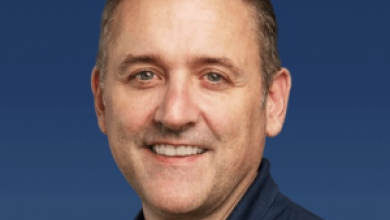
The rush to the cloud among customers, and more remote working as a result of the pandemic, has created a cyber security sales bonanza among European service providers, reports data management and security software vendor Acronis.
IT Europa is in Schaffhausen, Switzerland this week, attending the firm's European #CyberFit Summit at its corporate headquarters. The conference was attended by about 200 of the company's MSP and technology alliance partners, keen to learn how Acronis was going to make it easier for them to get a bigger slice of the growing security services pie.
Acronis CEO Patrick Pulvermueller (pictured) set out a corporate strategy to help them do that, and his current market summary illustrated the lucrative opportunity now available.
He said the cyber protection market was now growing at a compound annual growth rate of 22%. He added that there was certainly plenty to go round for all the players involved, as the market was “fragmented”, saying that none of his company's competitors had more than 5% of the market.
Acronis used to be mainly known for its data backup solutions, but over the last five years or so it has greatly expanded its security and data recovery offerings in response to market demand.
“There is significant investment in cyber security managed services,” he said. This was helped by the increasing and targeted ransomware attacks on organisations, supply chain attacks on MSPs which then affect their end customers, zero day vulnerabilities spiralling in the wild, and critical infrastructure attacks covered by the news media.
Matthew Ball, chief analyst at Canalys, said the overall EMEA managed services market represented 28% of the world total of $92.9 billion spent through those partners in 2020.
Ball said the increasing threats driving this growth were perhaps illustrated by the fact that cyber insurance costs were spiralling.
Five years ago, cyber insurance and recovery services were starting to be heavily promoted by consulting firms and security specialists. But since the increased number of globally damaging ransomware attacks, Ball said cyber insurance premiums had jumped by around 40%.
Maybe this isn't surprising when you consider the recent Kaseya supply chain ransomware attack, which took the MSP software provider two weeks to recover from, and after laying out millions of dollars to pay for that recovery and compensating end customers.
As for better serving Acronis' 20,000 service providers going forward, Pulvermueller said the firm would be opening many more data centres around the world to bring services closer to MSPs, to reduce latency and satisfy their growing demands for data sovereignty in the countries they operated in.
While confirming the company had no interest in building these facilities itself, he said Acronis would continue to use a mix of hyperscalers (including Google Cloud and Microsoft Azure), international data centre services companies and national colocation providers, to open up new data centre space.
The company already has 21 data centres in Europe, and 38 in total. 14 of these have been opened in the last 12 months. In 2022, the plan is to scale this up to over 100, with a large number of the new openings taking place in the US, as part of the company's network edge “globally local” strategy.
In addition to increasing its data centre footprint, Pulvermueller said the firm would be doing more to help MSPs go after increasing business in public cloud data protection, introduce integrated support for many more niche and specialist data workloads, and help them chase greater levels of enterprise-level business.
Currently, 80% of the vendor's global sales are generated in the SMB market, but the way it is scaling up the reach of its services, many more big names are probably set to start appearing in its marketing and advertising over the next year or two.


